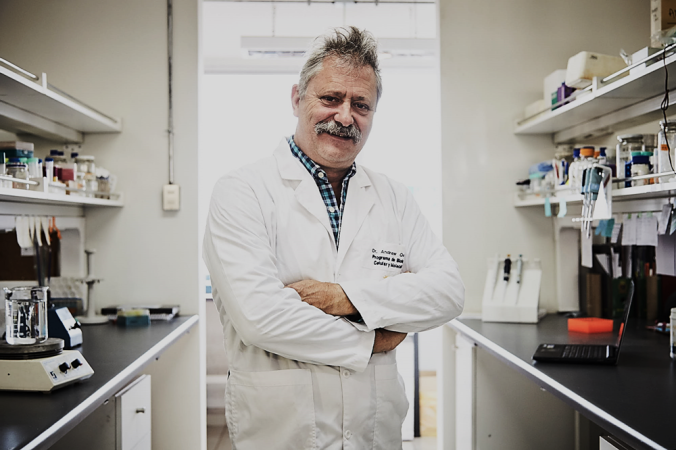Interviews
Fifty Years of Advances in Biochemistry: Dr. Andrew Quest Highlights Caveolin Protein Research and Cancer Studies
- November 8, 2024
- Publicado por: ACCDIS
- Category: ACCDiS in Media
Andrew Quest, principal investigator of the Center, Master's and PhD in Biochemistry from the Swiss Federal Institute of Technology, participated in the 2024 Symposia in commemoration of the 50th anniversary of the Society of Biochemistry and Cell Biology of Chile

Within the framework of the XLVII Annual Meeting 2024 of the Society of Biochemistry and Molecular Biology of Chile, where around 300 researchers and academics participated, various exhibitions were held, including 12 symposia. One of these symposia was held on October 3 and organized by Dr. Lorena Lobos-González and Dr. Andrew Quest.
During Dr. Quest entitled "Curcumin nanoformulations and their applications in the prevention and treatment of cancer", highlighted advances in understanding the dual role of the cavelin protein in cancer, which can act as a tumor suppressor or promote metastasis, Challenging the traditional view about proteins in this disease. Caveolin is a protein that has aroused interest in the field of biomedical research, especially in the study of cancer.
The researcher also discussed how epigenetic regulation affects caveolin expression in tumor cells, and how their interaction with other proteins, such as E-cadherin, that disappears in the epithelial-mesenchymal transition, make caveolin act as a tumor suppressor, characteristic that is lost when E-cadherin disappears. These findings have significant clinical implications, suggesting the potential of therapies that modulate caveolin activity and the use of curcumin nano formulations to improve cancer treatments.
The symposium, organized by Drs. Lorena Lobos-González and Andrew Quest, was part of the XLVII Annual Meeting 2024 of the Society of Biochemistry and Molecular Biology of Chile, held from September 30 to October 4 in La Serena. This event brought together researchers from various disciplines, promoting the exchange of ideas and collaboration in the fight against cancer.
In addition to Dr.. Lobos-González on "Achievements and Challenges in Biochemistry", Research on the secretome of mesenchymal stem cells as a biodrug for addictions and new sources of extracellular vesicles for wound healing were presented. The Dra. Ina Kurt from the University of Heidelberg also participated, Addressing strategies to find biomarkers in radioresistance.
The symposium offered a valuable platform to explore how biochemistry research can impact biomedical applications, highlighting the crucial role of collaboration in this field.
